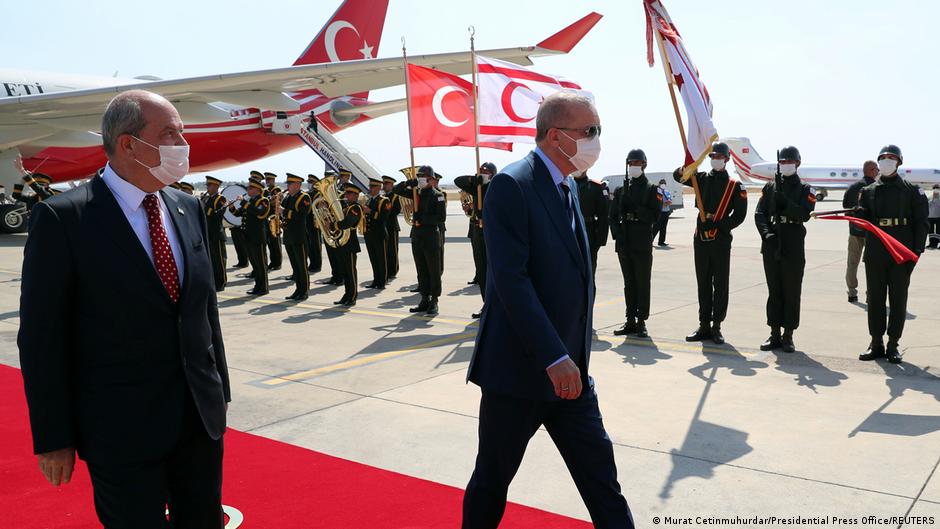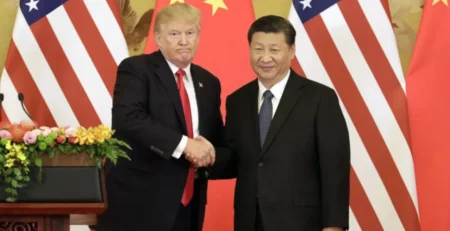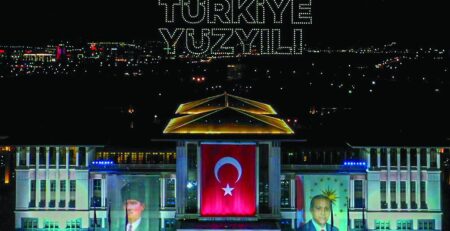Η διαίρεση της Κύπρου από την Τουρκία
“Ακόμη και όσοι συμμερίζθηκαν την αρχική παρέμβαση της Τουρκίας δεν είχαν καμία δικαιολογία για να τη διατηρήσουν για περισσότερο από μια εβδομάδα. Πράγματι, καθώς η Τουρκία διεκδικεί περαιτέρω αξιώσεις για τη Συρία, το Ιράκ, την Αρμενία και την Ελλάδα, το κόστος του να επιτραπεί στην Τουρκία να δράσει χωρίς συνέπειες είναι μεγάλο. Είναι καιρός ο Ερντογάν να αποφασίσει: να διατηρήσει την κατοχή ή να προεδρεύσει μιας χώρας σε οικονομική καταστροφή” , υποστηρίζει σε ανάλυση του ο Michael Rubin* , η οποία δημοσιεύτηκε στο nationalinterest.org/blog. Ο ίδιος διατυπώνει την άποψη ότι η Αμερική, η Ευρωπαϊκή Ένωση και οι μετριοπαθείς Άραβες σύμμαχοί της θα πρέπει να επιβάλουν κυρώσεις στην Τουρκία μέχρι να εγκαταλείψει την κατοχή της στην Κύπρο.

*Διαβάστε το άρθρο στο πρωτόπυπο αγγλικό κείμενο:
The division of Cyprus is fast approaching the half-century mark. In fact, that division has now lasted longer than that of Germany. Close to two-thirds of Cypriots were not yet born when Turkish troops first invaded the country. The United Nations Peacekeeping Force in Cyprus (UNFICYP) maintains the separation between Greek and Turkish Cypriots but it has failed to stop (let alone reverse) Turkey’s ethnic cleansing of the northern third of the island. While the United Nations has sporadically sponsored initiatives to end the occupation, these have gone nowhere. There have not been any substantive talks for the last three years, nor will there be: The discovery of vast gas deposits in Cypriot waters makes Turkish forces less likely to withdraw. When Turkey and Turkish Cypriots do engage, they do so insincerely to keep the process alive, even as they work to undermine any permanent solution.
There is little difference between Kuwait in 1990 and Cyprus today. Saddam Hussein may have resurrected revanchist claims against his southern neighbor just as Erdoğan now does, but Iraq invaded Kuwait primarily to loot its natural resources. The same now holds true for Turkey in Cyprus; Turkey’s original casus belli, protecting the Turkish Cypriot community against the Greek military junta disappeared within a week when Greece’s military regime collapsed and Greeks embraced democracy. Today, Freedom House ranks Greece completely free with a rating superior even to that of the United States. It ranks Turkey as not free, on par with Algeria and below the self-declared Republic of Artsakh in Nagorno-Karbakh in terms of rights and freedoms.
When Turkey invaded Cyprus, the United Nations Security Council unanimously passed a number of resolutions that were symbolic but toothless. They called for a ceasefire and deplored continued fighting and non-compliance. Since 1975, there have been more than four dozen additional resolutions, none of which have deterred Turkey from further consolidating its control of northern Cyprus. In effect, northern Cyprus reflects the United Nations at its most impotent.

The United Nation’s mission in Cyprus, which costs more than $50 million annually, is not meant to be a jobs program or to perpetuate Cyprus’ separation. To break the Cyprus impasse now requires a different approach. Too many countries have diluted sanctions or mitigated their approach to Turkey because of the size of Turkey’s military or economy.
Neither is a reason to allow Turkey to avoid accountability for its colonization and pillage. When the United Nations imposed its toughest sanctions to date on Iraq, Iraq had the fifth-largest army in the world. Today, Turkey’s army is just the fifteenth largest. The outrageousness of Iraq’s actions led even the more commercially inclined European countries to abide by sanctions despite its role as a major oil exporter. While Erdoğan says that Turkey seeks to become one of the world’s top ten economies, eighteen years of his rule now puts Turkey on the verge of falling out of the top twenty. And just as Saddam once sought to blackmail the world with human shields, threatened his own people, and promised retaliation against neighboring states, Erdoğan has threatened to weaponize both refugees and to leverage Turkish emigres against the European countries which had embraced them. Both threats were real, but they were and are reason to plan rather than give up.
Diplomats prefer go-slow approaches, but it is hard to fathom the approach they have tried for forty-seven years will suddenly begin to work. It is time for serious sanctions on Turkey. Rather than slowly ratchet sanctions up on Turkey in a way that allows Ankara to adjust and bypass them, the goal of the United States, European Union, and moderate Arab bloc should be to overwhelm Turkey and its already foundering economy. The Pastor Andrew Brunson case highlighted Turkey’s vulnerability to tariffs. The United States and European Union should shutter Turkish banks that operate in northern Cyprus or fund its operations. The European Union and United States should also ban Turkish Air and any other carrier that serves Turkish-occupied northern Cyprus from European airspace, and should sanction any Turkish or international company that does business in the occupied zone. All officials who serve in the illicit Northern Cypriot government should also face individual sanctions as should those who invest in Varosha or other occupied cities. All states should consider Northern Cypriot passports fraudulent. All states maintaining relations with Cyprus should also close representative offices of the Turkish Republic of Northern Cyprus in their territories. Rather than rely on Erdoğan’s goodwill, the United States, European Union, and Arab bloc might then lift sanctions only as the Turkish Republic of Northern Cyprus dissolves. The United Nations should consider an outright embargo on arms sales to or from Turkey.
There is no diplomatic reason to enable Europe’s longest occupation to continue past a half century or, with exploration for offshore gas, to allow Turkey to profit from it. An Iraq comparison does not mean military action, of course, although Cyprus and its allies do have the right to one day expel Turkish outposts on the island by force if other coercive measures fail.
*Ο Michael Rubin is a resident scholar at the American Enterprise Institute and a frequent author for the National Interest. / Τα ενυπόγραφα κείμενα απηχούν τις απόψεις των συγγραφέων τους




